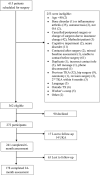Psychosocial Determinants of Total Knee Arthroplasty Outcomes Two Years After Surgery
- PMID: 32969193
- PMCID: PMC7571405
- DOI: 10.1002/acr2.11178
Psychosocial Determinants of Total Knee Arthroplasty Outcomes Two Years After Surgery
Abstract
Objective: To evaluate the association of preoperative psychosocial and demographic factors with total knee arthroplasty (TKA) outcomes and satisfaction in patients with osteoarthritis (OA) of the knee at 24 months after surgery.
Methods: A prospective cohort study of patients undergoing TKA was conducted. Outcome measures included: Western Ontario and McMaster Universities Osteoarthritis Index (WOMAC) and Short Form 36 (SF-36) scores at baseline and 24 months after surgery, and patient satisfaction with TKA at 24 months. Linear regression models were performed to evaluate the association of preoperative psychosocial determinants (ie, Medical Outcome Study Social Support Scale; Depression, Anxiety, and Stress Scale; Brief COPE inventory, The Life Orientation Test-Revised; Multidimensional Health Locus of Control; and Arthritis Self-Efficacy Scale) on outcomes.
Results: We included 178 patients. Increasing WOMAC pain scores at 24 months were associated with increasing age and body mass index (BMI); low tangible social support and low optimism were associated with higher levels of pain (R2 = 0.15). A decrease in WOMAC function scores was also associated with older age and higher BMI; low tangible support, increased stress, and low optimism were also associated with worse function (R2 = 0.22). When evaluating quality of life, lower SF-36 physical functioning scores at 24 months were associated with age, high BMI, and comorbidity (R2 = 0.34). Lower SF-36 mental functioning scores were associated with depression and low optimism (R2 = 0.38). Having a dysfunctional style of coping was associated with lower satisfaction with surgery after 24 months (adjusted R2 = 0.12).
Conclusion: Psychosocial factors, such as tangible support, depression, dysfunctional coping, and optimism, were associated with pain, function, and satisfaction 2 years after TKA. Perioperative programs identifying and addressing psychosocial problems may result in improvements in pain and function after TKA.
© 2020 The Authors. ACR Open Rheumatology published by Wiley Periodicals LLC on behalf of American College of Rheumatology.
References
-
- Lopez‐Olivo MA, Landon GC, Siff SJ, Edelstein D, Pak C, Kallen MA, et al. Psychosocial determinants of outcomes in knee replacement. Ann Rheum Dis 2011;70:1775–81. - PubMed
-
- Hochberg MC, Altman RD, April KT, Benkhalti M, Guyatt G, McGowan J, et al. American College of Rheumatology 2012 recommendations for the use of nonpharmacologic and pharmacologic therapies in osteoarthritis of the hand, hip, and knee. Arthritis Care Res (Hoboken) 2012;64:465–74. - PubMed
-
- Jones CA, Voaklander DC, Johnston DW, Suarez‐Almazor ME. Health related quality of life outcomes after total hip and knee arthroplasties in a community based population. J Rheumatol 2000;27:1745–52. - PubMed
-
- Nakahara H, Okazaki K, Mizu‐Uchi H, Hamai S, Tashiro Y, Matsuda S, et al. Correlations between patient satisfaction and ability to perform daily activities after total knee arthroplasty: why aren't patients satisfied? [research support]. J Orthop Sci 2015;20:87–92. - PubMed
Grants and funding
LinkOut - more resources
Full Text Sources


